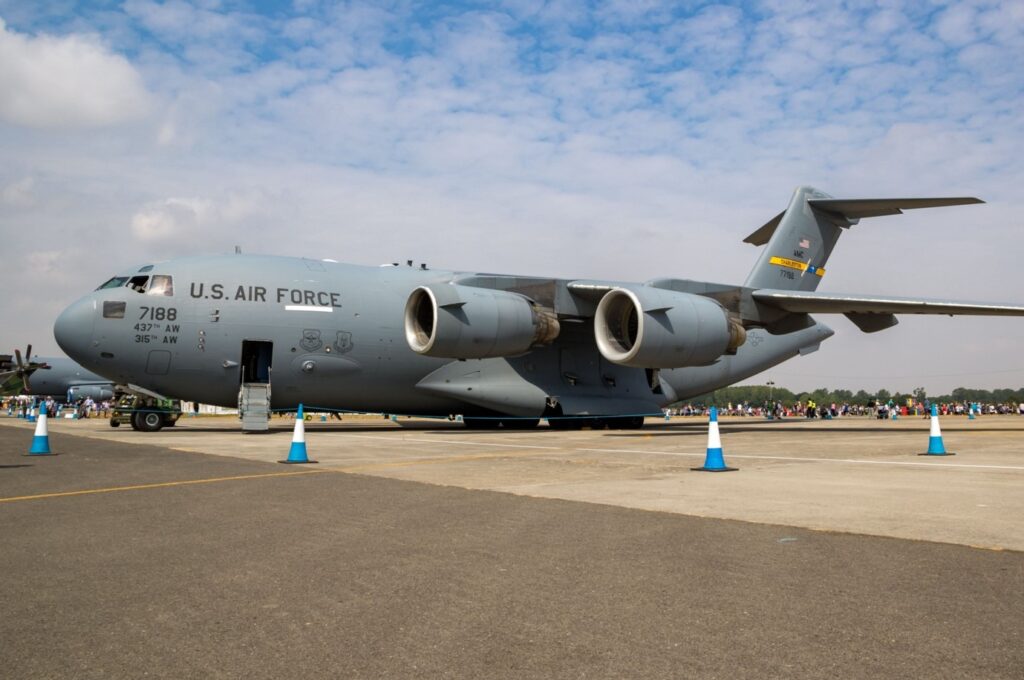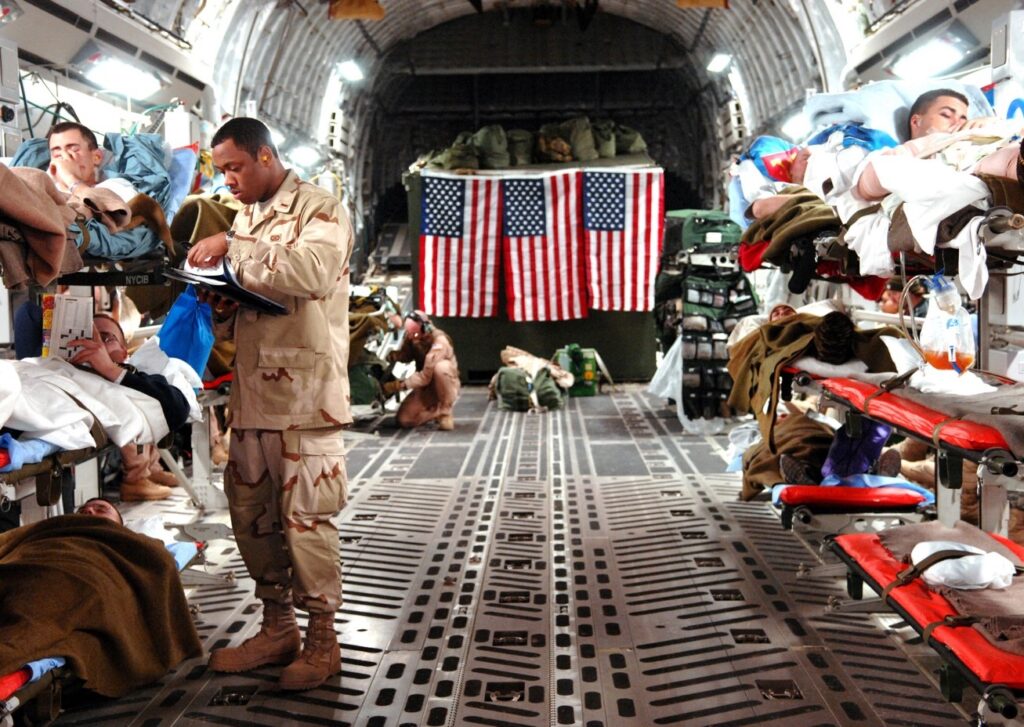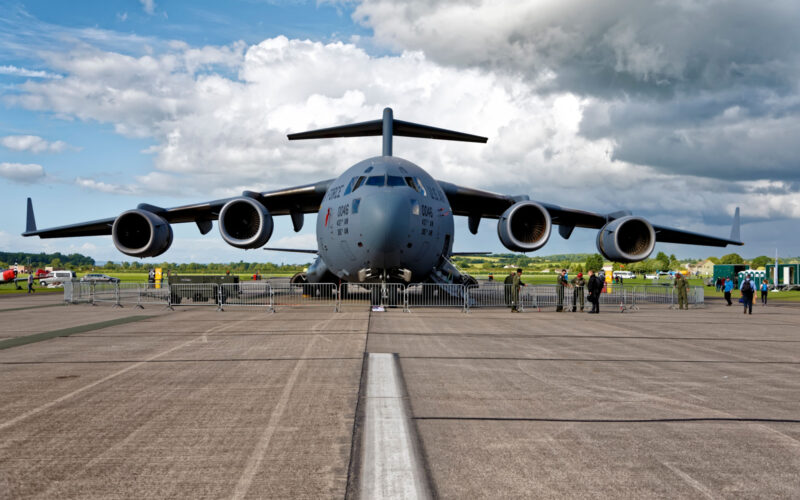The Boeing C-17 Globemaster III is a modern long-haul military aviation cargo aircraft. This tactical airlifter currently plays a pivotal role in military logistics, humanitarian missions and troop deployments around the world.
Here we’ll delve into the history, features, and performance of the C-17 Globemaster III, as well as exploring its design, variants, price, current operators and deliveries – plus its potential future.
C-17 Globemaster III history
The development of the C-17 Globemaster III began in the early 1980s when the United States Air Force (USAF) sought a replacement for its aging fleet of C-141 Starlifter transports. McDonnell Douglas, which later merged with Boeing, won the contract for the new airlifter. The C-17 made its first flight in 1991 and was officially introduced into service in 1995.
The aircraft quickly gained a reputation for its reliability, flexibility and mission success rate, achieving a 92% probability of successful mission completion. It has also maintained a low requirement of just 20 maintenance man-hours per flying hour, as well as availability rates of 74% percent for full missions and 82% for partial missions.
Over the years, the C-17 has been deployed in various theaters of operation, including Iraq, Afghanistan, and other regions where rapid deployment of troops and cargo was essential. Its ability to transport oversized cargo, such as tanks, helicopters and even other aircraft, has made it an indispensable tool for military logistical needs. During its initial test flights, the C-17 claimed 22 various world records related to its flight performance and cargo capabilities.
Moreover, the C-17 plays a crucial role in humanitarian efforts worldwide. It has been employed in relief missions following natural disasters, delivering supplies, equipment and medical aid to regions in need.
Design
The C-17 boasts a design that enables it to excel in various roles. It features a high-wing, four-engine configuration, a T-tail empennage, and rear cargo doors and loading ramps for efficient loading and unloading. Its cargo compartment can accommodate a wide range of cargo, including military vehicles, helicopters and paratroopers.
The aircraft is also equipped with advanced avionics, such as a radar system for weather and mapping, known as the AlliedSignal AN/APS-133(V), and self-protection systems that can operate in hostile environments.

C-17’s performance
The C-17’s four Pratt & Whitney F117-PW-100 turbofan engines generate 40,440 pounds of thrust each, allowing it to carry a maximum payload of 170,900 pounds (77,500 kg). It has a top speed of approximately 515 knots (950 km/h) and a range of 2,780 miles (4,480 km) without aerial refueling.
The aircraft can also operate from extremely basic airfields, including unpaved runways, thanks to its Short Takeoff and Landing (STOL) capabilities. The C-17 is capable of both taking off and landing on runways as short as 3,500 feet (1,064 meters) in length or just 90 feet (27.4 meters) in width.
General specifications
| Specs | C-17A |
| Crew | 2 pilots and 1 loadmaster |
| Length | 174 ft (53 m) |
| Wingspan | 169.9 ft (51.75 m) |
| Height | 55.1 ft (16.79 m) |
| Maximum Takeoff Weight | 585,000 lb (265,352 kg) |
| Maximum Payload | 17,750 lbs (8,051 kg) |
| Maximum G-load | 7.5 Gs |
| Service Ceiling | 45,000 ft (14,000 m) |
| Capacity (maximum) | 170,900 lb (77,519 kg) |
Performance specifications
| Specs | C-17A |
| Cruise Speed | 450 kn (830 km/h) |
| Range | 2,780 mi (4,480 km) |
| Engines | Four Pratt & Whitney PW2000 turbofan engines |
| Thrust (per engine) | 40,440 lbf (179.9 kN) |
Variants
The C-17 Globemaster III has given rise to various versions and modifications over the years, including specialized models for medical evacuation (MEDEVAC). These variants have enhanced its utility and adaptability in different mission scenarios, as follows:
- C-17A: The original military airlift version.
- C-17A ‘ER’: C-17As got an extended range by adding a center wing tank in 2001.
- C-17B: Proposed but unadopted version with enhancements for shorter take-off and landing.
- KC-17: Proposed tanker version of the C-17.
- MD-17: Proposed for US airlines in the Civil Reserve Air Fleet

C-17 Globemaster III price
The cost of a C-17 Globemaster III can vary depending on the relevant configurations and equipment. However, the average unit cost at present is estimated to be around $340 million.
Current operators and deliveries
The C-17 Globemaster III is now in service with the USAF, as well as several international operators, including the United Kingdom, Europe, the United Arab Emirates, Canada, Australia, Qatar, Kuwait and India.
As of 2015, a total of 279 aircraft units were built, with 270 of them having been delivered by 2019. Production spanned from 1991 to 2015. As Dennis Muilenburg, President of Boeing Defense, Space & Security informed the public: “Our customers around the world face very tough budget environments. While the desire for the C-17’s capabilities is high, budgets cannot support additional purchases in the timing required to keep the production line open.”

